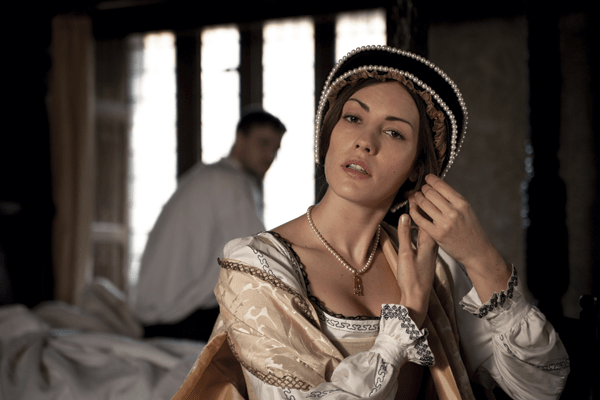A marvellous novelty at the Tower of London. The Banqueting Suite of the New Armouries has been converted into a pop-up theatre and the Tower authorities have welcomed a new play following the rise and fall (into two pieces) of Anne Boleyn.
Joanna Carrick, who directs her own script, has chosen a tricky format. Two characters, Anne and her brother George, tell the story of Anne’s fatal marriage to Henry VIII. Even Aeschylus found this ancient format rather constricting and introduced a third character. Perhaps Carrick knows better. Anne and George are evidently attracted to each other and they romp around a four-poster bed exchanging gossip in fits of giggles. At first the characterisation is a little thin. Then it gets thinner.
George (Scott Ellis) is a bumptious, greedy posh boy, who, if he lived today, would be a Mayfair hedge funder with an Aston Martin, two mistresses and herpes. Anne (Emma Connell) is stunningly beautiful but difficult to warm to. She’s a heartless, truculent minx determined to snare the king in order to stoke her vanity, ambition and megalomania. If this is an accurate portrait, it’s a wonder Henry didn’t lop her bonce off earlier. There’s not a trace of grandeur, mystery or depth to these callous schemers. And the actors have been encouraged to shriek their lines at road-drill volume even though the spectators are close enough to tap them politely on the arm and ask them to ‘bring it down a bit’. It’s a huge relief when both are executed.
The play ends with a sentimental glimpse of two ghosts in heaven dancing together in a chaste clinch. Overhead, meanwhile, an exploding lampshade showers the twirling figures with confetti made out of chopped-up rejection letters from West End backers. Hats off to the Tower. Heads off for the producers.
Soho Theatre’s biennial writing prize, the Verity Bargate (or ‘Veritable Garbage’ as it’s known to detractors), was awarded in 2011 to Thomas Eccleshare. His winning play, Pastoral, offers a dystopian vision of the future in which Britain is being invaded by swarms of aggressive trees. Total dendro-mania ensues. Motorways erupt under pressure from fast-growing oaks. Shopping malls collapse as young saplings thrust upward through the foundations. Cherry trees wrap themselves around skyscrapers and bring them crashing to the ground. A dotty grandmother, and her assorted family, take shelter in the ruins of a blighted suburb.
The script is occasionally funny but the muddled narration keeps messing things up. As often in sci-fi fantasy, logic and natural causation are thrown out of the window and the characters become mere glove puppets in the hands of a mad, whimsical tyrant. Worse, the play fails to obey the strictures of its own premise. The invading forestations of supertrees produce no edible fruit and yet they support herds of rabbits, deer and other wildlife. The surviving humans, armed with guns, go hunting amid all this plenty but they can bag nothing bigger than a hedgehog. They try to roast the plucked beast on an open fire but discover that the brushwood — through some extra twist of fate — is incombustible. Hunger drives them to murder a tramp and devour him raw. Then a bear arrives, off stage, and eats some of the humans.
The next illogicality escapes me but I have no doubt what causes this sort of slipshod writing: lack of human interest. Eccleshare hasn’t the skill or brains to examine the dark pathways of the soul so he keeps throwing in new plot curves to deflect attention from his feeble powers of characterisation. The play ends on a familiar platitude. Two characters grab each other in a chaste clinch while an exploding lampshade overhead showers them with confetti. And yet, the most amazing thing about this mirthless, ill-structured prison sentence of a play is that it attracted rave reviews from three of the national dailies, and from a well-regarded online site as well. It boasts a handful of four-star notices alongside glowing accolades like ‘splendid’, ‘wondrous’, ‘a master-class’. Utterly baffling. Are these people on drugs?
I’m not alone in sensing that the daily papers are far too keen to hyperventilate with enthusiasm over feeble, boring and half-witted shows. ‘____ ____ has taken his happy pills again!’ I heard one jubilant producer confide to another at a press night recently. Critics who go into raptures over near-flops risk turning their columns into the sort of perfumed screeds recited at the funerals of Asian dictators. And though the reviewers themselves get a kick out of composing these sugar-rich eulogies, they’re betraying the profession by publishing exaggerations and falsehoods, and, even worse, they’re cheating the readers. PS. As I filed this article, I saw the first review of Fallen in Love in a national daily. It got four stars.







Comments